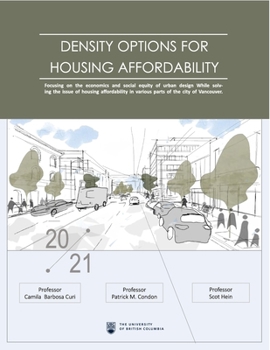Density Options for Housing Affordability
In the summer of 2021, in the midst of the pandemic, twenty five students hailing from all parts of the globe participated, some remotely, some in person, in a unique learning experience. Their assignment: solve the housing affordability problem in one of the world's most expensive cities - Vancouver BC. Vancouver has among the world's most expensive housing and the lowest average wages of any major North American metropolitan area. This outrageous gap is putting immense financial pressure on city wage earners and impeding the city's economic vitality. And adding thousand of market housing units in the city has not lowered prices. In fact, during the 40 years when tens of thousands of new housing units were added to the city, housing prices increased by 300 percent (in the inflation adjusted terms). Both homeowners and renters are affected by this inflationary spiral, as when home prices rise so too do rents. In this studio students were asked to explore a new and promising approach: using zoning tools as a means for affordability. The concept was simple. Instead of upzoning in the hopes of new housing supply producing a drop in prices, a strategy that seemed only to raise land prices, what if land was only up zoned in return for affordability. This would potentially keep land prices stable while allowing affordable housing projects to "pencil out" without government subsidy. This model has been adopted in Cambridge Mass (https: //www.jchs.harvard.edu/blog/what-can-we-expect-cambridges-new-affordable-housing-overlay) and Berkeley California ( https: //beyondchron.org/berkeleys-next-big-step-a-100-affordable-housing-overlay/) and shows great promise. For the study area, we chose various test sites along the West Broadway Corridor. This corridor is now being replanned in response to the ongoing construction of the Broadway extension of the Millenium Line Skytrain line. It is anticipated that much new development will be approved along this new line - to capitalize on this massive infrastructure expenditure. But anxiety still exists: how can we be sure that wage earners, those most in need of housing close to new jobs and sustainable transit, will be able to afford housing?
Format:Paperback
Language:English
ISBN:1794894055
ISBN13:9781794894051
Release Date:November 2021
Publisher:Lulu.com
Length:274 Pages
Weight:1.90 lbs.
Dimensions:0.7" x 8.5" x 11.0"
Related Subjects
ArchitectureCustomer Reviews
0 rating





